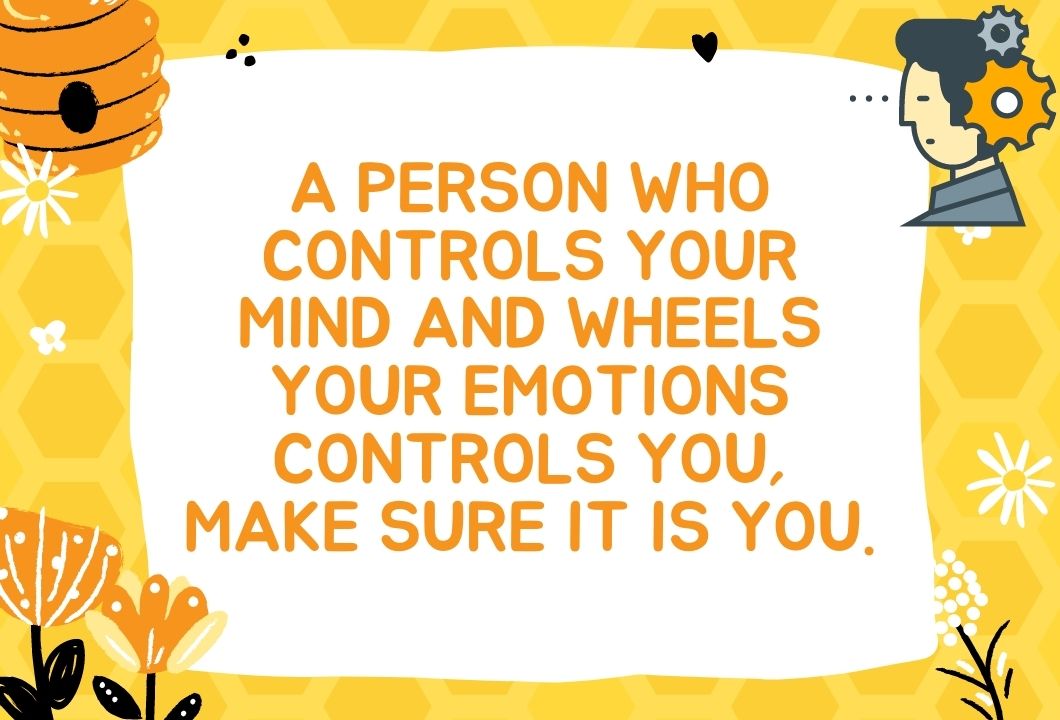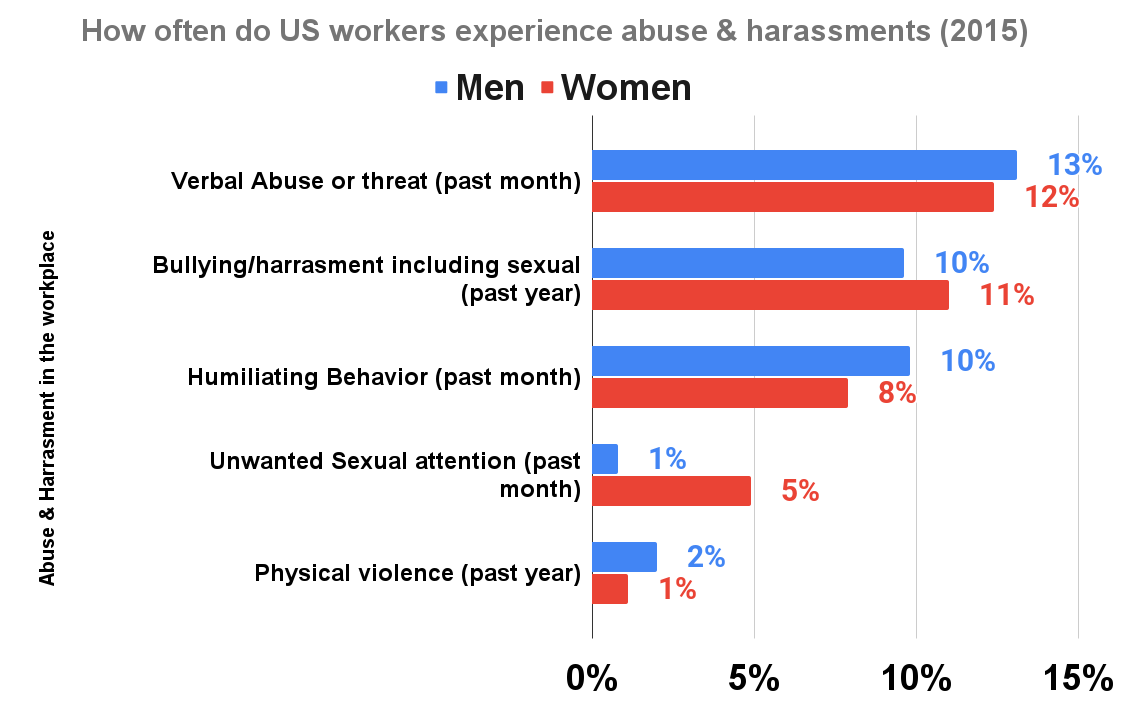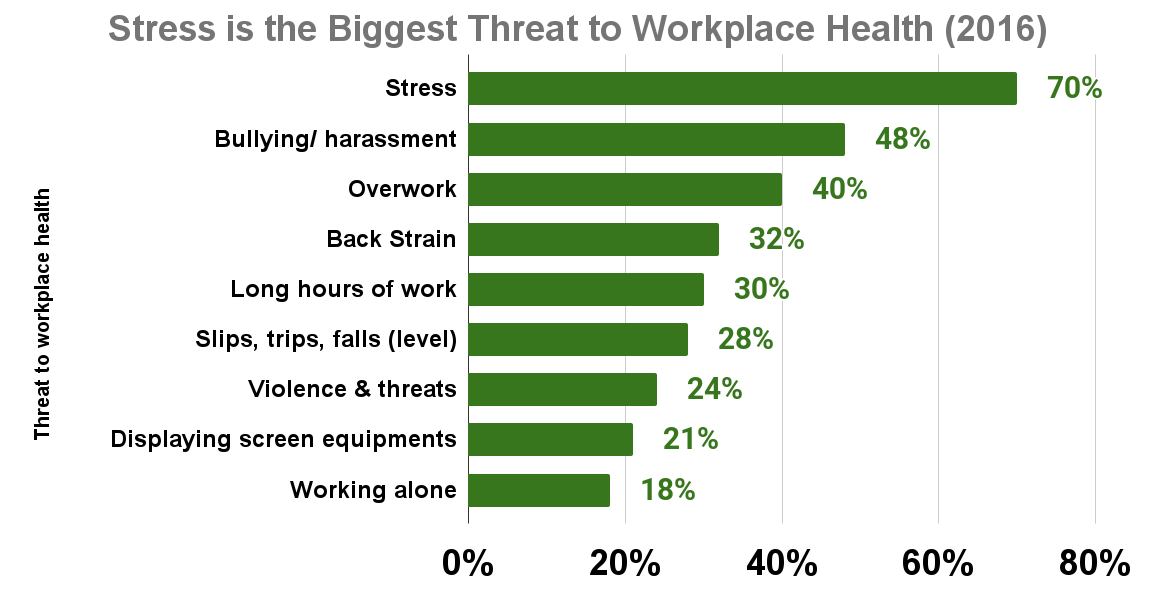Signs of an Emotionally Abusive Boss
WhatToGetMy Instructional Article
- You are probably asking yourself ‘am I a terrible employee or is my boss emotionally abusive to me?’.
- To deal with emotional abuse and overcome it, you need to be able to identify it in all its subtlety
- In this article, we have listed signs of an emotionally abusive boss and proffered ways to deal with emotional harassment in the workplace.
‘A person who controls your mind and wheels your emotions controls you, make sure it is you.’

Did you know that emotional abuse is more common in the workplace than physical abuse? Many studies have shown that people report being threatened, harassed, and humiliated than being physically violated in the workplace and one of those studies is this one by Statista as shown in the chart below. Women reported more harassment and bullying than men. Also, verbal abuse and threats were the most common form of abuse people experienced in their workplaces.

We have divided our article into three subtopics;
- Identifying emotional abuse
- Signs of an emotionally abusive boss
- How to deal with an abusive boss
IDENTIFYING EMOTIONAL ABUSE
Table of Contents
Are you struggling to tell if you are being abused at work by your boss? This section should help you gain more clarity about emotional abuse in the workplace.
Emotional abuse by managers, supervisors, or bosses is quite common but underreported. This might be because this form of abuse comes in many subtle ways and is often given a pass as ‘trivial’. Also, many employees do not report emotionally abusive bosses because they are unable to prove emotional abuse. In many cases, it is the word of the employee against the word of the boss when there is no recorded proof of abuse. In such a situation, the employee risks being seen as a troublesome or extremely sensitive individual.
Here are a few questions that should help you gain more clarity on whether you are being abused at work.
- Has your boss acted in ways that isolated you from the rest of your colleagues?
- Has your boss talked down to you in front of clients and other employees to embarrass you and make you lose respect in the sight of others?
- Does our boss yell at you or make condescending remarks at you to devalue you in front of others?
- Do you always feel like the next payday is your last day at work because of the attitude of your boss or supervisor? Do you feel unsure about having a job in the organization because of your boss’s subtle threats?
- Are you beginning to question yourself and your ability as an employee because of some repetitive comments, gestures, and actions of your boss or supervisor?
- Do you usually get the silent treatment from your boss or supervisor that makes you feel unwelcome, and isolated in your place of work?
- Does your boss constantly use certain items or actions to incite fear in you?
- Are the actions of your boss making the workplace unbearable for you, such that you are unable to think nor concentrate at work?
- Does your boss regard the contribution of male employees better than female employees? Does he make sexist comments?
- Does he swear at mistakes or display some emotional outbursts when angry that frightens you and makes you too cautious?
- Does your boss withhold certain privileges or information when there is a misunderstanding or conflicting values?
- Has your work been assigned to another colleague and your credits given to another person despite your efforts? Has this been done to spite you?
Karakurt and Silver1 defined emotional abuse as any nonphysical behavior or attitude that is designed to control, subdue, punish, or isolate another person, through the use of humiliation and fear. It can also be seen as any action against a person that is geared at creating a hostile environment for them at work.
Emotional abuse has been called terms like harassment, mental abuse, psychological abuse, personality conflict, workplace mistreatment, workplace aggression, verbal abuse, workplace harassment, and interpersonal source of job (Keashly, 1998).
Emotional abuse is just as powerful as physical abuse if not more powerful because its effect lingers for a very long time. Emotional harassment/bullying in the workplace is the second biggest threat to workplace health and therefore should not be ignored.
Threat to Workplace Health. Source: Statista.

SIGNS OF AN EMOTIONALLY ABUSIVE BOSS
According to researchers, most often, when emotional abuse occurs in the workplace, the abusive actions are done repeatedly to the victims. The goal of the abusers is to cause fear, humiliation, stress, frustration, and other forms of hardship. This is to gain or display power and control over victims. Here are characteristics of abusive bosses in the workplace;
1. Lacks trust for employees and therefore Hawk watch and boss them around
Abusive managers or abusive bosses lack trust for employees and therefore micromanage them. Their lack of trust does not necessarily stem from the actions of employees but probably from past unresolved issues. By constantly hawk watching and bossing employees, they make employees fear, stress, and be resentful. Workers should have a certain level of autonomy to perform their duties to the best of their ability, especially workers that have been around for a while.
If a boss is always watching over you like a hawk and bossing you around, and you have done nothing that warrants a lack of trust, you have every right to say ‘my boss is emotionally abusive’. Their actions are not only stressful and uncomfortable but also send the wrong message that you are not competent and trustworthy.
2. Gives the silent treatment
An emotionally abusive boss will use the silent treatment for a while as a method of correction, to alienate an employee, instead of speaking up and ironing out issues maturely. The silent treatment is disrespectful and discomforting to employees. Some bosses go as far as ignoring the comment of an employee on group chats while reacting or responding to other employees’ comments. This is an appalling way to treat an employee, especially among their colleagues.
If your boss uses the silent treatment to get you rattled, feel terrible, humiliated, and isolated, your boss is emotionally abusive.
3. Withhold important information and benefits
Emotionally abusive bosses or managers withhold information from employees as a method of punishment; to isolate, cause mistakes, delay, or limit employees. They also withhold information and benefits to cause employees to beg. Most often, when such bosses are confronted with this behavior, they either gaslight, yell, or feign ignorance and maybe apologize for their mistakes whereas they purposely acted that way. Situations like these are sensitive and sometimes difficult to prove.
If your boss has repeatedly withheld information or benefits from you as a way of isolating you, getting you to make mistakes and look stupid in front of others, delaying your progress, they are emotionally abusive. If they also want you to beg and stress over what should not be a big deal, they are emotionally abusive.
4. Uses derogatory name/ condescending terms & gestures
Emotionally abusive bosses are also verbally abusive. They address employees condescendingly by using derogatory terms, attitudes, and gestures in front of their colleagues, family, and clients, without regarding their feelings or how they make employees look in front of others. Emotionally abusive bosses often do this either to display power and control over employees, get employees to doubt themselves, or humiliate and hurt employees.
If your boss gives you condescending attitudes and makes derogatory comments or gestures to you privately, or in front of clients, family, and colleagues while disregarding your emotions and reputation, he or she is emotionally abusive.
5. Intimidate through withholding acknowledgments and reassigning duties to spite
An emotionally abusive boss will normally act blind to the efforts and achievements of an employee they do not like and pick on their flaws more often. An emotionally abusive boss will also assign or take away certain duties to spite/ punish an employee.
If your boss is always quick to pick on your faults and hardly commends your efforts, your boss is emotionally abusive. if they assign you to perform tasks below your expertises just to spite you or burden you, you are being emotionally abused at work.
6. Engages is explosive outbursts
If your boss often engages in any explosive outbursts that include insults, curses, threats, and other forms of intimidation, your boss is emotionally abusive. His or her actions are not intended to correct but instead, to humiliate, cause stress and fear.
7. Threatens employee’s job
Emotionally abusive bosses always make employees unsure of retaining their jobs at every chance they get. They do this by displaying poor attitudes and making nasty comments. Their aim is to incite fear, stress, and discomfort in their employees and use it as a method to control them.
If you have to always worry about your job safety every time you sense that your boss is not happy with you or news of retrenchment circulates, then there is a problem.
8. Your boss engages in a lot of gossips and favoritism practice
If an employee has a good reason to believe that their boss is gossiping about them, their performance, or revealing their personal information, then they are being abused at work. Emotionally abusive bosses gossip about employees to other colleagues to cause distress and undermine an employee. Your boss might show preferences for certain workers more than the rest. This action creates segregation, resentment, and jealousy among employees.
9. Emphasizes past mistakes and gives harsh criticism often
An emotionally abusive boss often emphasizes the mistakes of their employees to humiliate, stress, intimidate, guilt, or control. They rarely let go of the past and will always bring it up in the present. It is almost as if they are compiling all your data of wrongdoings.
Be proactive in dealing with emotional abuse
HOW TO DEAL WITH AN ABUSIVE BOSS
Studies show that employee abuse by employers experiences diminished motivation to work and mental or physical impairment. They are more likely to quit or change jobs, make unnecessary errors while on duty, have insomnia, lose self-esteem, have a nervous breakdown, go on leaves or relocate. Looking at some of the negative effects of abuse, employees must be proactive in dealing with it. Here are some of the ways to deal with an abusive boss;
1. REPORT/ SPEAK UP
One of the major reasons why abusive managers are not properly dealt with is because victims choose to endure and ignore their poor behaviors instead of reporting or speaking up about it. By enduring emotional abuse, you are letting your abuser think it is ok for them to continue in that behavior and that they have much power to treat you anyhow they wish. If your abusive manager can be reported to superiors, report. Those in higher authority must know what you are going through. If there are no higher authorities, respectfully but confidently speak to your boss about behaviors that are abusive to you. If you are unable to speak to your boss directly and no one can support you to speak up, try other listed options. You must compile reports/ evidence of your boss’s abusive behaviors if you need to address them properly.
2. BUILD SUPPORT
The last thing an employee that is facing emotional harassment in the workplace wants to do is to stand alone or be isolated. It will only empower the abuser and leave the victim helpless. If you are being abused by your boss at work, you need people on your side even if it’s just one person. If other employees are victims of your abusive boss, try to stay connected with them. They are your witnesses. More so, you guys can work together and provide valuable insight on how to deal with the situation. In a situation where you are the only employee, make other people around you aware of what you are going through. They may look for ways to watch over you and be witnesses to your boss’s abusive behavior.
3. FOCUS ON YOUR WORK NOT THE ABUSER
One thing many abusive employers crave is to see the effect of their manipulative/ abusive ways on their victims. They enjoy your fear, timidity, stress, pleadings, and other shows of discomfort. When the abuser notices that you rarely pay attention to them but your work and perfecting it, it rattles them. Of course, they may not take this lightly and be more aggressive, but it is important to stay objective by focusing on your work, perfecting it, and enhancing your skill. It will give you a competitive edge as you look for other opportunities. Also, you will be able to speak confidently about your work and defend it if you have to.
4. REFUSE INTIMIDATION AND BLAME
The abuser will always want to feel justified in their actions. They will highlight your flaws as a reason for acting awfully. When you are, accept your wrong but speak up against how they have chosen to address it. Do not accept blame for their poor behavior. Do not react poorly to the abusers’ treatment because they will be counting on it to use it against you. Do not engage your verbally abusive boss in their pettiness. Your boss needs to know that you can speak up for yourself confidently and gracefully.
5. TIGHTEN UP
It is not only important to mentally make your boss less important, but also your actions should show it. Ignore your boss and what he or she thinks about you but do not ignore your work. This means that you will still communicate with your boss but solely on the task level. Pay little attention to other things s/he does in the organization that is not work-related and that do not affect you. This includes his gisting with other employees etcetera. Act ignorant when and where needed. Being passive-aggressive is not always a bad thing.
FAQ
1. My boss is verbally abusive, what should I do?
If you have a verbally abusive boss, it is important to learn to be calm, do not engage in insults with your boss, confidently let your boss know that you do not like to be addressed in such a manner, report them to superiors if they have, work to gain support with your colleagues, carefully document all cases of abuse, report to authorities if you have to, and learn to walk away from such boss and their business.
CONCLUDING REMARK
Abusive bosses are common and usually have a lot of employees quitting under their watch. Abusive bosses encourage fear, timidity, stress, and isolation. Choosing not to address cases of emotional abuse encourages the abuser. By letting them know that you do not accept nor tolerate their actions, it diminishes whatever power they think they have over you. It is important to think about your well-being. If you cannot deal with an abusive boss, walk away from them.
REFERENCES
Karakurt, G., & Silver, K. E. (2013). Emotional abuse in intimate relationships: The role of gender and age. Violence and victims, 28(5), 804-821.
02 HOURS 09 MINUTES
ESTIMATED TIME DESIGNING AND UPLOADING THIS ARTICLE
10 HOURS 26 MINUTES
ESTIMATED TIME RESEARCHING AND WRITING THIS ARTICLE
You Might Also Like

Valentine’s Day Gifts for Female Coworker
Valentine’s Day is all about love and gift exchange between life partners. However, you won’t spend all of your time with your soulmate. Most people are likely to spend at least a third of their lives with colleagues. Whether you like people you work with

13 Signs Your Boyfriend Likes His Female Friend
13 Signs Your Boyfriend Likes His Female Friend WhatToGetMy Instructional Article It is ok to want to know beyond all reasonable doubts that your boyfriend and his female friend are indeed just friends. Nobody should make a fool of your emotions and love. If you’ve

33 Signs You Either Didn’t Get the Job or Will Get the Job After Interview
Signs You Either Didn’t Get the Job or Will Get the Job After Interview WhatToGetMy Instructional Article This article will tell you how to know if you didn’t get the job after an interview and how to know if you got the job after the

Have you ever been protected or vouched by your boss from something you did for the company? How about a coworker covering up your schedule or activity because you have to attend an emergency? Then you must have had that grateful feeling towards them. If

Signs of an Emotionally Abusive Boss
Signs of an Emotionally Abusive Boss WhatToGetMy Instructional Article You are probably asking yourself ‘am I a terrible employee or is my boss emotionally abusive to me?’. To deal with emotional abuse and overcome it, you need to be able to identify it in all

What to Do When Quitting a Job – 17 Things to Do Before and After Quitting Your Job
What to Do When Quitting a Job – 17 Things to Do Before and After Quitting Your Job WhatToGetMy Instructional Article It is perfectly normal to quit your job as shown by the millions that according to research by SHRM based on U.S. Department of

How to Get a Male Coworker to Like You
How to Get a Male Coworker to Like You WhatToGetMy Instructional Article Before embarking on wanting to get a guy at work to like you, or flirt at work, be certain that there are no policies in your company against romantic relationships between coworkers. Where

Gifts for Executives That Have Everything
When searching for gifts for executives that have everything, you have to find the perfect balance between form, functionality, and usability. The greatest challenge is to find a special something that your executive didn’t think of. Most of them already have everything they need, and

15 Signs Your Boss Doesn’t Respect You and What to Do.
15 Signs Your Boss Doesn’t Respect You and What to Do. WhatToGetMy Instructional Article Disrespect by bosses is one of the common traits of horrible bosses. For whatever reason, some bosses just can’t help but disrespect their employees as a way of feeling powerful or

How to Make Time Go by Faster at Work – 15 Ways to Speed up Time at Work
How to Make Time Go by Faster at Work – 15 Ways to Speed up Time at Work WhatToGetMy Instructional Article At some point or another, you have probably wanted to time go faster at work, school, and even home. Maybe you were bored or


